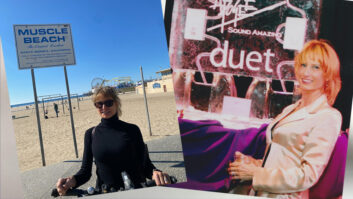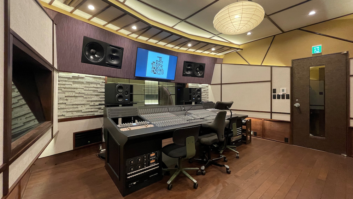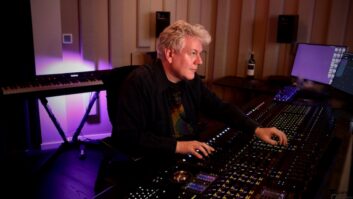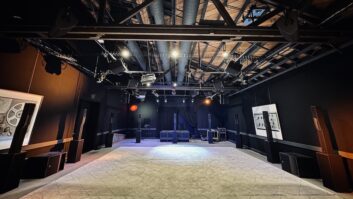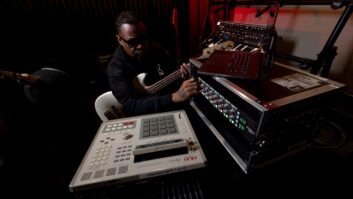Los Angeles, CA—Any article about Jacob Collier must inevitably begin with a list of his accomplishments, and with good reason: he’s done so much, and in such a short time. Largely self-taught, he’s a composer, arranger, producer, engineer and mixer who sang every line and played every instrument on his debut album, 2016’s In My Room, which he recorded in his room at the family home in London at the age of 21. It earned him two Grammy Awards.
And that’s barely scratching the surface. It doesn’t cover his signing with Quincy Jones’ management company; hooking up with MIT Labs Ph.D. student Ben Bloomberg to create the technology for his one-man shows, which recently morphed into a full-band touring project (see link below from PSN May 2019); or his live collaborations, self-made videos, TED talks or master classes.
Related: Live Sound Showcase: Jacob Collier, by Steve Harvey, April 25, 2019
In late 2018, Collier announced his next album project, and it’s an effort very much in keeping with his life to date. Djesse is a four-volume opus of more than 40 songs, each album focusing on a different musical world. Featuring a host of collaborators, it was mixed and mainly recorded in his room, but also in Holland, Portugal, Morocco, Japan, the United States and Abbey Road Studios in London.
“Each volume is almost like a different sonic universe,” says Collier. “The first is orchestral, so it’s really broad and about space. The second is a lot more intimate and cozy. That’s basically folk music, so a lot of smaller rooms, closer-sounding things, lots of delicate ingredients, like a string sextet.” Djesse–Volume 2 will be released June 28 via Hajanga Records, licensed exclusively through Decca/Geffen.

He continues, “Volume 3 is a lot more of the electronic, digital, hip-hop, R&B, broken beat kind of crazy stuff. There’s a lot of sound play. That’s where I get to unleash a lot of my Logic chops, in the sense that I can achieve strange grooves with odd sounds; I’ve been wandering around the world recording all these weird sounds. Then the fourth and final quartile is fundamentally based on a 45-piece church choir based out of Huntsville, AL. Those guys were recorded in Nashville.”
Despite his facility with any instrument he cares to pick up, Collier’s musical universe revolves around Logic Pro. “I’d almost say that that workspace is more prevalent in my creative life than any musical instrument, just because it was my canvas from day one. I’ve used Logic since I was 11 years old,” he says, adding, “I was on Cubase for four years before that.”
Related: Reinventing ‘Remain in Light,’ by Steve Harvey, Jan. 3, 2019
As far as playing musical instruments goes, he says, “I’ve picked up a few different dialects, I suppose, of music as a language, with piano and bass and drums and vocals and guitar—but I don’t necessarily think of myself as an instrumentalist; I think of myself as a musician. Playing musical instruments will teach you a lot about music, but it’s a means to an end, and Logic ends up being the end, often, for me. That’s where I can join all these different elements together and figure out a way for them to coexist.”
As the sole producer of the Djesse album cycle, a large part of his job has been to bring cohesion and continuity to the project, he says. “The challenge is to make it feel like one continuous story and not just a jumble of different worlds. But also, it’s managing all these different physical spaces and getting them to feel coherent and not like you’re jumping back and forth in terms of sound worlds. I’m used to my room in London. I’ve been working in that space since day one. It’s been really exciting to travel and to expand my space to meet other people’s spaces, and then to shrink those spaces back into my room without reducing any of the impact or scale.”
Collier’s productions are known for layered vocal harmonies, a feature of the live shows that he achieves through use of the Harmonizer. Bloomberg, Collier’s live show production director, custom-configured the collection of electronics to enable Collier to generate up to 12-part harmonies from his vocal on stage in a similar manner to a vocoder. However, combine all those vocals with tracks and tracks of instruments in the studio and Logic eventually runs out of steam.
Related: SSL Gets Experimental at MIT, Dec. 6, 2017
“Logic has a 253-audio track limit, which is a real bind. I’ve been moaning about that for so many years now,” he says. As Collier has explained elsewhere previously, it’s not unusual for him to create a separate project for each section of a song, otherwise he would quickly run out of tracks.
But working in Apple’s Logic Pro X environment offers a bonus—namely the MainStage companion app, which enables Collier to bring the sounds of his recordings into his live show. “I’ve gotten very used to my sounds,” he says, “so the really cool thing is, from my MainStage, I can have the exact same sounds so that people in the band can play them and it feels very similar to the recorded version on the album and my creative space at home.”
Globetrotting to record with orchestras and collaborators, he’s had to learn how to get Logic to play nice with other DAWs. Recording the Metropole Orkest under the direction of Jules Buckley in Holland, for example, “The challenge there was to get the Pro Tools tracks out and into Logic.”
Want more stories like this? Subscribe to our newsletter and get it delivered right to your inbox.
As it turns out, Bloomberg was also able to bring his talents to bear in the studio. “It’s been amazing to have Ben in tow because he’s had some amazing experience with recording spaces, far more engineering experience than I’ve ever had. To have Ben involved with, for example, engineering the orchestra sessions and the church choir sessions, has been super cool because he has a really keen idea as to how best to get that space to translate into the listening experience.”
Collier’s role as Djesse’s producer is almost akin to that of a movie director. “It’s organizing space in a very particular way. Obviously, I’m writing the music and orchestrating and arranging it, but I guess it really is about managing sound in the biggest possible sense. That’s why this quadruple album was such a juicy challenge to me—45 songs in totally different genres with 26 different collaborators, all my musical heroes. It was about how can I find this continuum of sound worlds where things are consistent, effective and there’s no extraneous rubbish? It cuts to the point and just tells that story.”
Jacob Collier • www.jacobcollier.com

